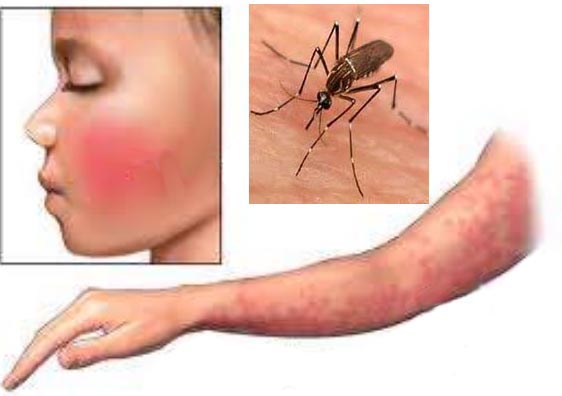Dengue

Published: 18 Jun 2025
ICD9: 061 ICD10: A90 ICD11: 1D22
Dengue fever, often called dengue, is a mosquito-borne viral infection that can cause flu-like illness.
Here's a breakdown of what you need to know:
Key Facts about Dengue:
![]() Cause: It's caused by any one of four closely related dengue viruses (DENV-1, DENV-2, DENV-3, and DENV-4).
Cause: It's caused by any one of four closely related dengue viruses (DENV-1, DENV-2, DENV-3, and DENV-4).
![]() Transmission: Transmitted to humans through the bite of infected *Aedes* mosquitoes, primarily *Aedes aegypti* and, to a lesser extent, *Aedes albopictus*. These mosquitoes also transmit chikungunya, Zika, and yellow fever.
Transmission: Transmitted to humans through the bite of infected *Aedes* mosquitoes, primarily *Aedes aegypti* and, to a lesser extent, *Aedes albopictus*. These mosquitoes also transmit chikungunya, Zika, and yellow fever.
![]() Symptoms:
Symptoms:![]()

![]() High fever (104°F / 40°C)
High fever (104°F / 40°C)![]()

![]() Severe headache
Severe headache![]()

![]() Pain behind the eyes
Pain behind the eyes![]()

![]() Muscle and joint pain
Muscle and joint pain![]()

![]() Nausea and vomiting
Nausea and vomiting![]()

![]() Swollen glands
Swollen glands![]()

![]() Rash (typically appears 2-5 days after the start of fever)
Rash (typically appears 2-5 days after the start of fever)
![]() Severity: Dengue can range from mild to severe. Severe dengue (also known as dengue hemorrhagic fever) can be life-threatening.
Severity: Dengue can range from mild to severe. Severe dengue (also known as dengue hemorrhagic fever) can be life-threatening.
![]() Complications of Severe Dengue:
Complications of Severe Dengue:![]()

![]() Damage to blood vessels and lymph vessels
Damage to blood vessels and lymph vessels![]()

![]() Bleeding from the nose, gums, or under the skin
Bleeding from the nose, gums, or under the skin![]()

![]() Internal bleeding
Internal bleeding![]()

![]() Organ damage (liver, lungs, heart)
Organ damage (liver, lungs, heart)![]()

![]() Low blood pressure (shock)
Low blood pressure (shock)
![]() Treatment: There is no specific antiviral medication to treat dengue. Treatment focuses on relieving symptoms:
Treatment: There is no specific antiviral medication to treat dengue. Treatment focuses on relieving symptoms:![]()

![]() Rest
Rest![]()

![]() Hydration (drinking plenty of fluids)
Hydration (drinking plenty of fluids)![]()

![]() Pain relievers (acetaminophen/paracetamol is usually recommended; avoid aspirin and ibuprofen, which can increase the risk of bleeding)
Pain relievers (acetaminophen/paracetamol is usually recommended; avoid aspirin and ibuprofen, which can increase the risk of bleeding)![]()

![]() Hospitalization may be necessary for severe cases.
Hospitalization may be necessary for severe cases.
![]() Prevention: The best way to prevent dengue is to avoid mosquito bites:
Prevention: The best way to prevent dengue is to avoid mosquito bites:![]()

![]() Use mosquito repellent (containing DEET, picaridin, IR3535, or oil of lemon eucalyptus)
Use mosquito repellent (containing DEET, picaridin, IR3535, or oil of lemon eucalyptus)![]()

![]() Wear long sleeves and pants
Wear long sleeves and pants![]()

![]() Stay in air-conditioned or well-screened rooms
Stay in air-conditioned or well-screened rooms![]()

![]() Eliminate mosquito breeding sites: empty standing water in containers like flower pots, buckets, tires, and gutters.
Eliminate mosquito breeding sites: empty standing water in containers like flower pots, buckets, tires, and gutters.
![]() Vaccine: Dengvaxia is a dengue vaccine licensed and available in some countries for individuals with confirmed prior dengue infection. A newer vaccine called Qdenga has been approved in several countries (including the EU, Indonesia, and Brazil) and is approved for use in individuals regardless of prior dengue infection, but it's not yet widely available in all areas. Consult with a healthcare professional about vaccine options.
Vaccine: Dengvaxia is a dengue vaccine licensed and available in some countries for individuals with confirmed prior dengue infection. A newer vaccine called Qdenga has been approved in several countries (including the EU, Indonesia, and Brazil) and is approved for use in individuals regardless of prior dengue infection, but it's not yet widely available in all areas. Consult with a healthcare professional about vaccine options.
Why is Dengue a Concern?
![]() Global Health Issue: Dengue is endemic in many tropical and subtropical areas of the world, particularly in Southeast Asia, the Western Pacific, Latin America, and Africa.
Global Health Issue: Dengue is endemic in many tropical and subtropical areas of the world, particularly in Southeast Asia, the Western Pacific, Latin America, and Africa.
![]() Increasing Incidence: The incidence of dengue has increased dramatically in recent decades.
Increasing Incidence: The incidence of dengue has increased dramatically in recent decades.
![]() Re-infection: You can get dengue more than once. Each time you are infected with a different dengue virus serotype, the risk of developing severe dengue increases.
Re-infection: You can get dengue more than once. Each time you are infected with a different dengue virus serotype, the risk of developing severe dengue increases.
If you think you have dengue, it's important to see a doctor as soon as possible for diagnosis and treatment.